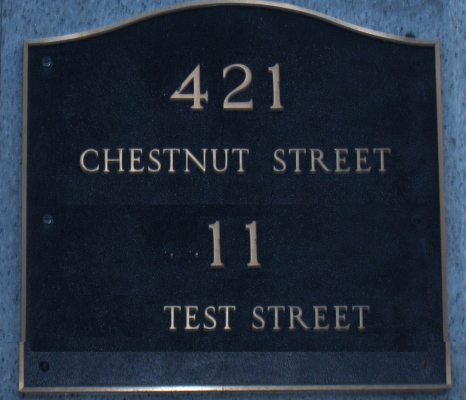I’m at the rear counter of a curio shop, ordering a mocha latte for my aunt Dolores. The owner, a woman in her 70s, is describing the size options to me in a not-abundantly-clear fashion. The small sounds rather small but is not terribly expensive though a number is not given. The large is $15 for newcomers, less for repeat customers. And two are, of course, $30. Because I am who I am even in my dreams, I order one small and wait for the cup.
My aunt and other traveling companions, who may or may not include my mom and other family members, are outside, admiring the small town views of rural highways and endless land. Before I went inside, we were remarking on how each house had two addresses plainly written on their exteriors or mailboxes. It kind of looked like this, for each and every house we spied while walking around town:
This was a curious practice; I suspected part of the reason my aunt pressed some money into my hand and told me to go fetch her a latte was so that I could ask the locals in the shop what was up with the house addresses.
Through eavesdropping and some small inquiries, I had an answer. Turns out that there is a nearby town, larger, used for shopping trips and the like by the residents of the small town. The larger town has essentially consumed and absorbed the residential contents of the small town, though the small town seems to be suspicious of this. The two addresses reflect the locals’ shifting realities and inability to accept the larger city’s grand plan. One address is their official location relative to the larger town. The other is the small town address, from which no local can bear to part ways. Hearing this explanation made some sense to me, and I prepared to relay it to my travel partners. Just as soon as I received my potentially-expensive mocha latte, that is.
But before I could see the looks on their faces upon hearing the explanation, I woke up, wondering what was going to happen next. In reality, what happened was I took down some notes about this dream. And then I began musing on this dual-address state, not just of residence but of mind.
How often do we find ourselves with two “locations” in life? We are both children of our parents and adults (or even parents ourselves). We can be both an independent person and a spouse (with or without a new legal name). We can exist as a lover to a stranger and a stranger to our families. And often, for those who overthink our lives, we can exist as a fully realized adult human with accomplishments seen by our acquaintances and friends and yet feel like child who needs to get on with adulting to ourselves.
While our many statuses can act in concert to balance out our life goals or current choices, they can also act in opposition, causing suffering that is unnecessary. We contain multitudes, indeed. Each of these possibly dueling states has a “location” within our minds—and in the minds of those who surround us. Unlike those houses of my dream, we rarely wear both of our addresses at once. One is outside (the parent, the functioning adult, the artist) and one is inside (the dreamer, the child, the wanderer).
To boldly show both of our faces at the same time, both of our “addresses”, to the public at large is a rare act of vulnerability. It can make folks uncomfortable to see the duality freely acknowledged. Like when you see a politician cry during a speech. Or you see a woman breastfeeding in a business suit. Luckily, we live in an era that is starting to accept our many facets. That’s progress. Those examples I gave above might still raise an eyebrow, but they would have been unheard of—scandalous—a few decades ago.
What are your locations? Are they in neighboring towns, or are they antipodes so far apart there’s oceans and earth to keep them separated?
P.S. The original intent for this thread was to dig deeper and explore the history of name-changing for marriage and the cultural implications thereof, but it went in another direction, as thoughts often do. Perhaps I will explore the spousal tradition inquiry in a future post.
